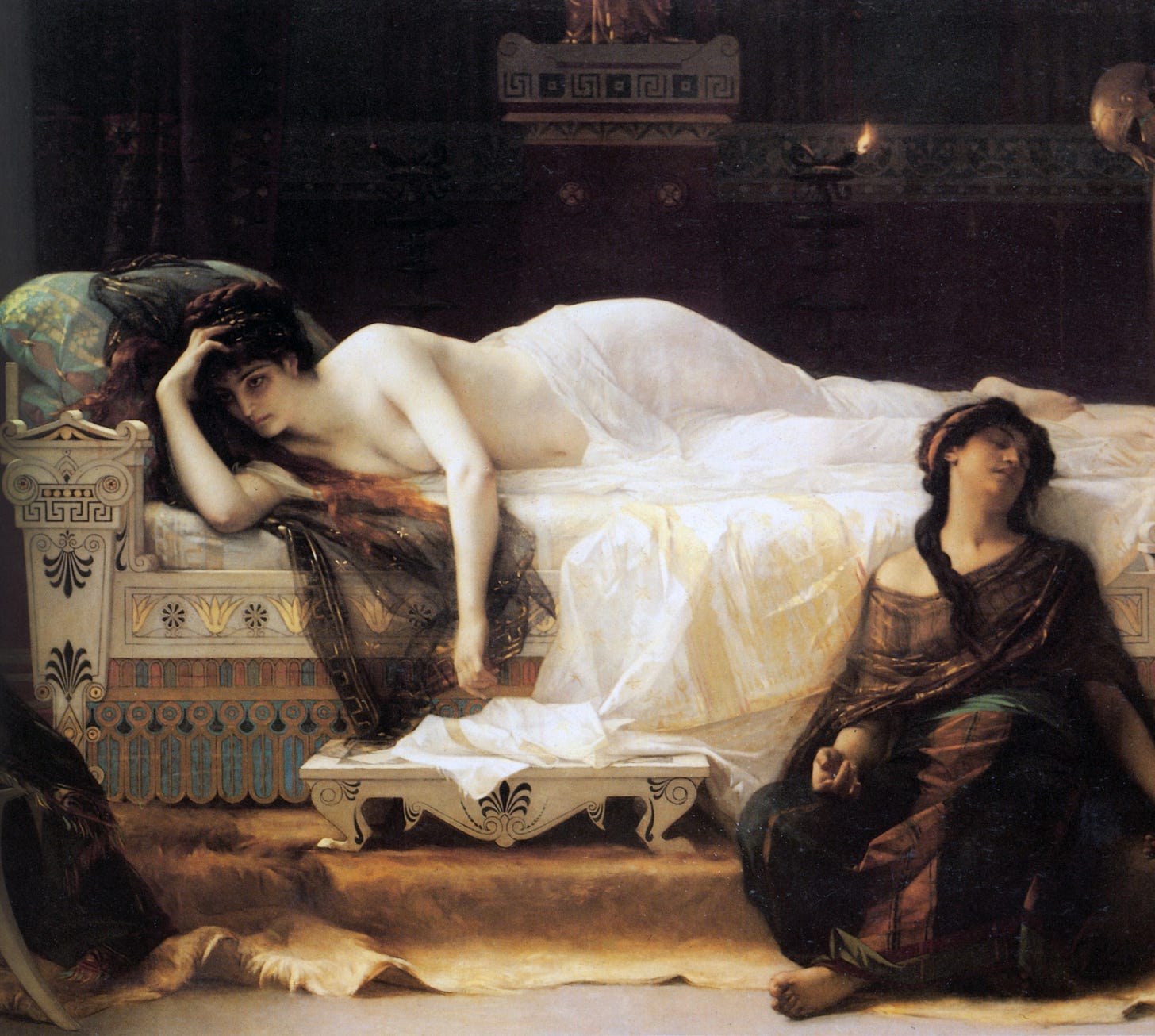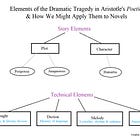Stop Calling Characters Unlikeable. Use These Words Instead:
An exploration of the way we talk about fictional characters, and some alternatives to consider
Last week on the podcast we discussed All’s Well by Mona Awad. It was a wild book, and often required effort to get through.
At one point in our conversation, in describing the protagonist, Miranda, I used the word ‘unlikeable’ for, I think, the first time. I had my reasons to call her that (which I explain a bit more in the full episode), but I am rethinking whether that was the best word to use — the word ‘unlikeable’ is just so (over)used in literary discourse that it was the first word that came to mind.
Before Neha and I started our podcast — before we entered the online book world — I had never encountered the word ‘unlikeable’ as it pertained to books. But now, three years in, I feel that I am drowning in a deluge of ‘unlikeable’s.
Those of us who are constantly thinking about books tend to have pet peeves and strong thoughts about language. Our podcast friends
and recently talked about hating when people say “I won't accept criticism of this book” and what the term ‘sparkling prose’ actually means (respectively). Many take issue with the phrase “didn't live up to the hype” (for it really isn’t a book’s job to ‘live up’ to whatever hype has been generated around it).My kryptonite is the word unlikeable. I hate it. It drives me up the wall.

There is a somewhat justified argument that this word is mostly used to describe female characters, and the idea of women being ‘likeable’ is a sexist construct that we don’t ascribe to men in the same way. I do agree with this, on some level — but this argument still doesn't get to the heart of the problem.
It has never1 occurred to me to call a book character ‘likeable.’ This is not a colleague I must work with on a project three times a week, where ‘likeability’ comes into play; it is a fictional character. If I only read books with ‘likeable’ characters (which, what does that even mean??), I'd be limiting my reading experience to characters and worlds very similar to mine —and that isn't why I read.
I read to get inside people’s minds. Every type of person that exists in this world — I want to know about all of them.
At its core, the word ‘unlikeable’ is terrible because it is too generic, and therefore holds no meaning. What didn’t you like about them? And are you talking about them as if they were a real person that you’d interact with, or as a character in their own world?
Like a lot of language on the internet, it lacks specificity. And this kind of generic language almost always has to do with a lack of critical thinking, poor vocabulary, or a misguided attempt to avoid hurting people’s feelings (or some combination of all three).
I’d like to challenge everyone to stop using this word — not just for book characters, but for anything. For what does it mean to be ‘likeable’? Likeable by whom? Likeable to whom? There are so many other words we could use — kind, wise, sharp-tongued, perspicacious, resourceful, affectionate, vindictive, petty, cruel, bitter, etc etc.
And so in lieu of this idiotic word, I’m proposing the following words and phrases that I think more accurately capture what you probably mean when you say that a character is ‘likeable,’ or ‘unlikeable.’
Compelling
This is the most common meaning, I think, of ‘likable.’ When we read, we want to feel invested in a character. We hope to care what happens to them, what decisions they make, how they will solve their way through various obstacles.
This is done in various ways, but some of the best ways that authors can make a character compelling are by (1) letting us into their interiority — their thoughts and emotions — as they work their way through decisions, (2) exposing their vulnerabilities to the reader, and (3) clearly delineating what’s at stake for the character.
I'll share the example of Scarlett O’Hara from Gone With the Wind: nobody in their right minds would call her ‘likeable.’ But she is incredibly compelling. Despite very serious problems with her ideology, and her often cruel behavior, most readers really root for Scarlett. We care about what happens to her. Because she is a compelling character.
So, too, is Dolores Umbridge. We are seething when we read about her educational decrees, because we feel compelled by the character we are encountering on the page.
Endearing
Some characters are so charming and adorable that you just wish they were standing in front of you so you could give them a big hug. I don’t often read books that are marketed as ‘wholesome’ or ‘heartwarming’ (in fact, those descriptions often cause me to run in the opposite direction), but I know a lot of readers do love those books! And a lot of why people are drawn to these novels is the way in which we slowly become attached to the characters. Readers who loved A Man Called Ove might feel this way about the titular character. I definitely felt this way about many of the characters in A Gentleman in Moscow.
Complex
This is another word that, when used in isolation, is a bit of a nothingburger. Kind of like: okay, complex, and..? It is a word that requires more explanation — why is Lily Bart as a character complex? Because she knows what she needs to do and yet defies her own logic in order to grasp at an elusive freedom? Yes — and so much more. So the word ‘complex’ is alright… as an introduction; not in isolation. Explain what you mean. Explain why you think it’s true.
Round
This is somewhat related to complex, and I’m including it here not to recommend that you use this word, but to reference a commonly used descriptor (particularly in the writing/workshopping space). To this, I’ll reference Craft in the Real World, in which Matthew Salesses describes how the ideal of ‘round characters’ is a Western construct that works within a very specific type of literary tradition. Oftentimes, ‘flat’ or ‘typefied’ characters can be incredibly effective at what the author is setting out to do! It all depends on context.
Opaque
This word has more to do with the character within their fictional world than an assessment of the character from outside the book by the reader. To take a simple example, for the first five Harry Potter books, Severus Snape is an opaque character. Though Harry hates him, the narrator/implied author cloaks his actions and motivations, making him difficult to understand. This doesn’t mean that he is poorly drawn; it means that we do not yet have enough information to fully dive into his psychology.
In the case of Snape, we do eventually learn more about him — but some characters always remain rather opaque, like Hamlet or Anna Karenina. In consequence, these are some of the most fun characters to discuss, and offer opportunities for endless debate!
Impenetrable
At first glance, this seems similar to ‘opaque’ but I propose a distinction: ‘impenetrable’ is less about the way a character is constructed, and more about the reader’s comprehension. For example, I found the version of Mr. Rochester depicted in Wide Sargasso Sea impenetrable (who was he? Why did he do the things he did?) — but I know this is not a deficiency of the book, but rather a lack of understanding on my part. There are so many layers to this nuanced and complex novel that I know it would take many more rereads, and much more research and thought, for me to really understand this character, and the full project of the novel.
Relatable
This final option is one that I offer with a caveat. Use this word with caution, because it is one that bakes in a lot of assumptions about the context of the book, who wrote it, who they wrote it for, and who the reader is. Because, if I say a character is ‘relatable’ — relatable to whom? What does it mean for someone to be relatable?
When I was younger and I watched sitcoms on TV, I found a lot of the characters incredibly unrelatable: wearing shoes in the house (on the bed!), talking back to their parents, discussing sex and relationships at the dinner table — what kind of world was this?? But did that mean that the characters were poorly written, or the world was badly constructed? Of course not. It’s just that I wasn’t the intended audience. And so if you’re going to use the word relatable, you should also do the work to understand the context of the book and the tradition it was written in.
Let us know: is it okay to call characters ‘unlikeable’? What other words would you use to describe characters?
— Shruti
Links We Love
- writes about 50 books that taught her empathy in such topics as abuse, addiction, sexuality, mental health, and more. There are some excellent recommendations in here, and it prompted us to think about which books have helped us learn with empathy.
- is hosting a Middlemarch read-along this summer, and this exploration of sainthood, character, and marriage plots is a wonderful analysis of the prologue and first chapter.
Why we all need more Poetry, Literature, and Art in our Lives by
, all about reclaiming wonder and the human connection
Latest on The Novel Tea
Our last book discussion for season 5, All’s Well by Mona Awad, is out now wherever you get your podcasts! It’s a wild book — if you’ve been feeling like you wanted more context ever since you read the book, this episode is for you. We also share lots of context and connections to Shakespeare’s All’s Well that Ends Well, and MacBeth.
And up next is our final episode of season 5! In our wrap-up episode, we’ll zoom out and consider various forms of adaptations, discuss adaptation theory, and discuss our favorite (and least favorite) reading experiences from the past few months. That episode will be out on June 25.
And here are some of our latest newsletters that you might have missed:
Okay, except in our podcast episode about All’s Well — I plead guilty!







Thank you for the link to the Middlemarch read. I joined and am really enjoying it! I would not have found it without your post.
This post was amazing. I agree that most of the “unlikeable” characters I’ve seen mentioned (aside from Snape and - Lockhart, I believe?) were women. And the suggested word replacements are spot-on.